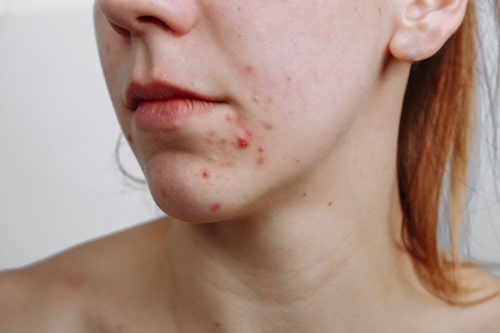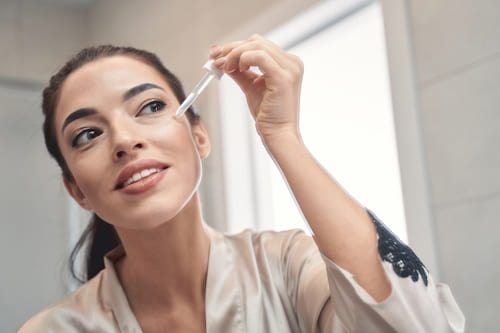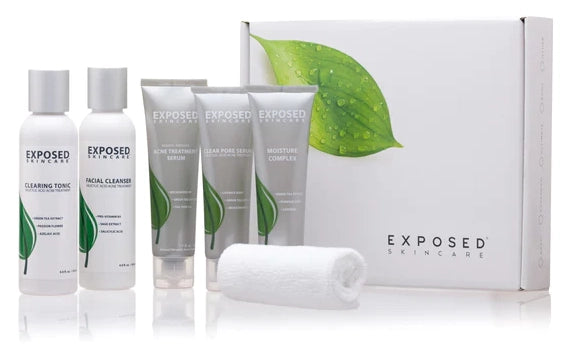Battling deep acne, particularly cystic acne, can feel like an uphill struggle. This severe form of acne not only causes physical discomfort but can also take a toll on one’s confidence.
Understanding the nuances of acne treatment for deep acne is crucial in navigating this skin condition effectively. This extensive guide will explore the four best treatments to tackle severe types of acne, including cystic acne, nodular acne, and severe inflammatory acne.
Also read: How to choose the best acne treatment
Biggest Take-Aways:
- Cystic acne requires a targeted approach, considering factors like excess oil, bacteria, and inflammation.
- Combining treatments, like topical retinoids, benzoyl peroxide, and salicylic acid, can be more effective than a single product.
- Lifestyle factors, including diet and stress management, play a significant role in managing acne.
- Exposed Skin Care is beneficial in treating acne due to its dual approach of combining natural and scientific ingredients to fight acne and promote skin health.

What is Deep Acne?
Before delving into the treatments, it’s essential to understand what deep acne truly is. Deep, or cystic acne, is a severe type of acne that forms deep within the skin and often results in large, painful cysts or nodules. These can lead to significant discomfort and, if left untreated, may cause scarring.
1. Topical Retinoids: A Frontline Defense Against Severe Acne
Understanding Topical Retinoids
Topical retinoids are derived from vitamin A and are highly effective in treating several forms of acne, including deep cystic acne. They work by promoting cell turnover, helping to unclog pores, and preventing the formation of acne cysts.
The Role of Topical Retinoids in Treating Deep Acne
- Unclogging Pores: Retinoids help exfoliate the skin and remove dead skin cells, preventing them from clogging pores.
- Reducing Inflammation: They have anti-inflammatory properties crucial in treating inflammatory acne that causes deep, painful cysts.
- Preventing Scarring: Retinoids can also help reduce the risk of scarring by promoting faster cell turnover.
Choosing the Right Retinoid
Several over-the-counter and prescription options are available, and choosing the right one depends on the severity of your acne and skin sensitivity.
2. Benzoyl Peroxide: An Effective Agent for Targeting Acne Bacteria
The Power of Benzoyl Peroxide
Benzoyl Peroxide is a well-known acne treatment that targets the bacteria that cause acne. It's particularly effective for inflammatory acne that causes deep and painful pimples.

How Benzoyl Peroxide Works
- Kills Acne-Causing Bacteria: It kills the bacteria deep in the pores.
- Clears Pores: Benzoyl Peroxide helps break down keratin, which can clog pores.
- Reduces Inflammation: Its antibacterial properties also help reduce inflammation associated with severe acne.
Finding the Right Concentration
Benzoyl peroxide is available in various concentrations, from mild formulations in over-the-counter products to stronger prescription strengths.
3. Salicylic Acid: A Key Player in Acne Control
Salicylic Acid: The Pore Unclogger
Salicylic acid, a beta-hydroxy acid, is renowned for its ability to penetrate into pores and dissolve the debris that causes acne.
Benefits of Salicylic Acid in Treating Deep Acne
- Deep Pore Cleansing: Salicylic acid goes deep into the skin to clear clogged pores.
- Preventing Future Breakouts: Regular use can help prevent the formation of new acne.
- Reducing Inflammation and Redness: It has anti-inflammatory properties that are beneficial for swollen, painful acne.
Incorporating Salicylic Acid into Your Routine
Salicylic acid is available in various forms, including cleansers, toners, and spot treatments. It's important to use it consistently for the best results.
4. Oral Medications: Tackling Severe Acne from Within
The Role of Oral Medications
For those with severe or persistent deep acne, oral medications can be a game-changer. These are typically used when topical treatments are not enough.

Types of Oral Medications for Deep Acne
- Antibiotics: Help reduce bacteria and inflammation.
- Hormonal Therapies: Especially effective in treating acne caused by hormonal changes.
- Isotretinoin: This powerful medication can be life-altering for the most severe cases of cystic acne.
Navigating the World of Oral Medications
Finding the right oral medication requires careful consideration of the type of acne, its severity, and individual health factors.
Combining Treatments for Maximum Effectiveness
Often, the best approach to treating severe forms of acne, like cystic acne and nodular acne, is a combination of treatments.
This might include topical treatments, such as retinoids or benzoyl peroxide, and oral medications for more severe cases. The key is to tailor the treatment plan to your skin's specific needs.
Developing a Personalized Acne Treatment Plan
- Assess Your Skin Type and Acne Severity: Understanding your specific skin needs is crucial in choosing the right treatment.
- Combine Topical and Oral Treatments: A combination approach often yields the best results for severe acne.
- Consistency is Key: Regular use of acne treatments is vital for effectiveness.
Lifestyle and Dietary Considerations in Acne Management
While topical and oral treatments are fundamental in managing deep acne, lifestyle and dietary factors also play a significant role. A balanced diet, adequate hydration, regular exercise, and stress management can all contribute to healthier skin.
The Impact of Diet and Lifestyle on Acne
- Healthy Eating: A diet rich in fruits, vegetables, and lean proteins can support skin health.
- Hydration: Drinking plenty of water helps detoxify the body and keep the skin hydrated.
- Stress Management: High-stress levels can exacerbate acne, making relaxation and stress management techniques important.

Maintaining Skin Health Post-Treatment
Once your acne is under control, maintaining skin health is crucial to prevent recurrence. This includes continuing a suitable skincare routine, avoiding known acne triggers, and making lifestyle choices supporting skin health.
Post-Acne Skin Care Tips
- Gentle Skincare: Use mild, non-comedogenic skincare products to keep the skin clean and hydrated without clogging pores.
- Sun Protection: Protecting your skin from the sun can prevent hyperpigmentation and scarring.
- Regular Exfoliation: Helps prevent pore clogging and keeps the skin smooth.
The Advantages of Exposed Skin Care in Managing Acne
Exposed Skin Care has emerged as a popular choice in acne treatment, especially for stubborn cystic acne patients. This product line combines science and nature to offer a comprehensive solution that addresses various factors that cause cystic acne.
The benefits of Exposed Skin Care are:
- Balances Oil Production: By regulating excess oil, Exposed Skin Care helps prevent the clogged pores that often lead to acne outbreaks.
- Targets Acne-Causing Bacteria: Its antibacterial properties effectively treat cystic acne by eliminating bacteria at the source.
- Reduces Inflammation: The soothing natural extracts in the products help reduce the inflammation and redness associated with severe acne types.
- Promotes Skin Healing: Ingredients like aloe vera and green tea extract support skin repair, aiding in the healing of existing acne while preventing new breakouts.
- Prevents Scarring: Regular use can also reduce the risk of scarring, a common concern for people with cystic acne.
Incorporating Exposed Skin Care into your acne skin-care routine can provide a multifaceted approach to treat and prevent acne. Its focus on targeting the root causes of acne, such as excess oil and bacteria, makes it a potent option for those seeking an effective cystic acne treatment plan.
Conclusion
Understanding deep or cystic acne and its development is key to choosing the right treatment options. Effective acne treatment, especially for those experiencing cystic pimple breakouts and acne on the back, involves a combination of methods that target the root causes of acne.
Medical acne treatments are designed to combat inflammation that often leads to cystic acne. These products, along with targeted spot treatment gels and varying concentrations of benzoyl peroxide, can help treat cystic acne effectively.
Incorporating products like Exposed Skin Care into their regimen can be beneficial for those seeking to get rid of deep acne and prevent cystic acne from recurring. This product line is known for tackling various aspects of severe acne and can also treat adult acne effectively.
Its formulation is designed to address current breakouts and prevent future ones, thereby reducing the risk of untreated cystic acne leading to long-term issues like scarring.
When it comes to cystic acne, the goal is not just to clear existing acne but also to prevent its recurrence. Remember, while over-the-counter products can be effective, cystic acne can cause deep swelling and sometimes require medical treatment.
FAQs
What causes cystic acne?
Cystic acne is often caused by a combination of hormonal changes, excess oil production, and bacteria growth in pores. Genetics and lifestyle factors can also contribute.
Can diet affect acne breakouts?
Yes, diet can impact acne. Foods high in sugar and dairy have been linked to increased acne breakouts. A balanced diet with plenty of water, fruits, and vegetables is recommended.
Is it possible to prevent cystic acne?
While not entirely preventable, managing factors like stress, diet, and using the right skincare products can significantly reduce cystic acne.
How can I treat severe acne scarring?
Severe acne scarring often requires professional treatments like laser therapy, chemical peels, or microneedling. Over-the-counter products with ingredients like retinol can also help to a lesser degree.
What are the benefits of Exposed Skin Care for acne?
Exposed Skin Care combines natural and scientific ingredients to combat acne. It helps regulate oil production, fights acne-causing bacteria, reduces inflammation, and aids in healing and preventing acne scarring.
















